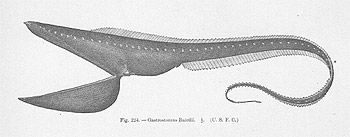Three Cruises of the United States Coast and Geodetic Survey Steamer "Blake": In the Gulf of Mexico, in the Caribbean Sea, and Along the Atlantic Coast of the United States, from 1877 to 1880
From 1877 to 1880, the U.S. Coast and Geodetic Survey dispatched the steamer Blake on three cruises of discovery—two expeditions to Florida, the Gulf of Mexico, and the Caribbean and one off the eastern Atlantic coast as far north as the Gulf of Maine. These cruises were designed to increase knowledge of the depths of the oceans and the animals and plants living on or near the bottom and to pioneer technological advances in oceanography.
 Vol. I, Title page
Vol. I, Title page
View High-Resolution Image (TIF, 156 KB) Vol. I, Fig.
173
Vol. I, Fig.
173
View High-Resolution Image (TIF, 120 KB) Vol. I, Fig.
29
Vol. I, Fig.
29
View High-Resolution Image (TIF, 120 KB) Vol. I, Page 171
Vol. I, Page 171
View High-Resolution Image (TIF, 624 KB) Vol. I, Page 172
Vol. I, Page 172
View High-Resolution Image (TIF, 664 KB) Vol. I, Page 173
Vol. I, Page 173
View High-Resolution Image (TIF, 596 KB) Vol. I, Page 174
Vol. I, Page 174
View High-Resolution Image (TIF, 588 KB) Vol. I, Page 175
Vol. I, Page 175
View High-Resolution Image (TIF, 728 KB) Vol. I, Page 176
Vol. I, Page 176
View High-Resolution Image (TIF, 648 KB) Vol. I, Page 177
Vol. I, Page 177
View High-Resolution Image (TIF, 672 KB) Vol. I, Page 178
Vol. I, Page 178
View High-Resolution Image (TIF, 600 KB) Vol. I, Page 179
Vol. I, Page 179
View High-Resolution Image (TIF, 640 KB) Vol. I, Page 180
Vol. I, Page 180
View High-Resolution Image (TIF, 772 KB) Vol. I, Page 181
Vol. I, Page 181
View High-Resolution Image (TIF, 772 KB) Vol. I, Page 182
Vol. I, Page 182
View High-Resolution Image (TIF, 672 KB) Vol. I, Page 183
Vol. I, Page 183
View High-Resolution Image (TIF, 708 KB) Vol. I, Page 184
Vol. I, Page 184
View High-Resolution Image (TIF, 612 KB)
This excerpt includes the title page, figures 29 and 173, and pages 171-184 from Volume I of the Three Cruises of the United States Coast and Geodetic Survey Steamer "Blake".
View the Flash vesion.
Alexander Agassiz (ag'-uh-see), the author of Three Cruises, is often considered the premier American oceanographer of the 19th century. Son of the famed naturalist Louis Agassiz, Alexander also was an accomplished naturalist. At the time he accompanied the U.S. Coast and Geodetic Survey Steamer Blake on the three cruises chronicled in this work, Agassiz was the Director of Harvard's Museum of Comparative Zoology; later he became president of the National Academy of Sciences. Previously, Agassiz helped to organize and describe species collected by the famous British Challenger expedition between 1872 and 1876.

This figure illustrates the foraging technique of the deep-sea fish, Gastrostomus Bairdii. The huge mouth funnels water and the food it contains into a large pouch behind the head. Scientists aboard one of the Blake's voyages caught this specimen at a depth of 898 fathoms (5,388 feet). (v. II, fig. 224)
During the 1877-1880 cruises highlighted in this volume, the steamer Blake pioneered development of oceanographic equipment, collected hundreds of deep-sea and coral reef species, traveled thousands of miles, studied the Gulf Stream, collected ocean temperatures, conducted sounding operations to determine ocean depths, and examined submarine deposits. Invited by the superintendent of the U.S. Coast and Geodetic Survey to act as naturalist on board the Blake, Agassiz called on his prior experiences to improve copper mining in Michigan to advance oceanographic equipment used on the Blake.
This volume draws upon the same groundbreaking work on the Blake that revolutionized oceanographic research trumpeted in Deep-Sea Sounding and Dredging by Charles Sigsbee, also in this collection of rare 19th century oceanographic books. Volume I of Three Cruises contains details of the equipment used on the voyages and improvements made to it, narrative essays of the cruises, sketches of the history of Gulf Stream studies and deep-sea exploration, and, for Agassiz, the first of many studies of Florida's coral reefs. A map of the Blake's cruises is at the end of this volume. Volume II contains descriptions and images of many of the species collected during the cruises.
- Author: Alexander Agassiz (1835-1910)
- Date Published: 1888
- Publisher: Houghton, Mifflin and Company, The Riverside Press
- Location: Boston and New York, Cambridge
- Length:
- Volume I, 314 pages
- Volume II, 220 pages
View Complete Rare Book
Three Cruises of the United States Coast and Geodetic Survey Steamer "Blake": In the Gulf of Mexico, in the Caribbean Sea, and Along the Atlantic Coast of the United States, from 1877 to 1880
Volume
I (pdf, 165 MB)
Volume
II (pdf, 98 MB)
